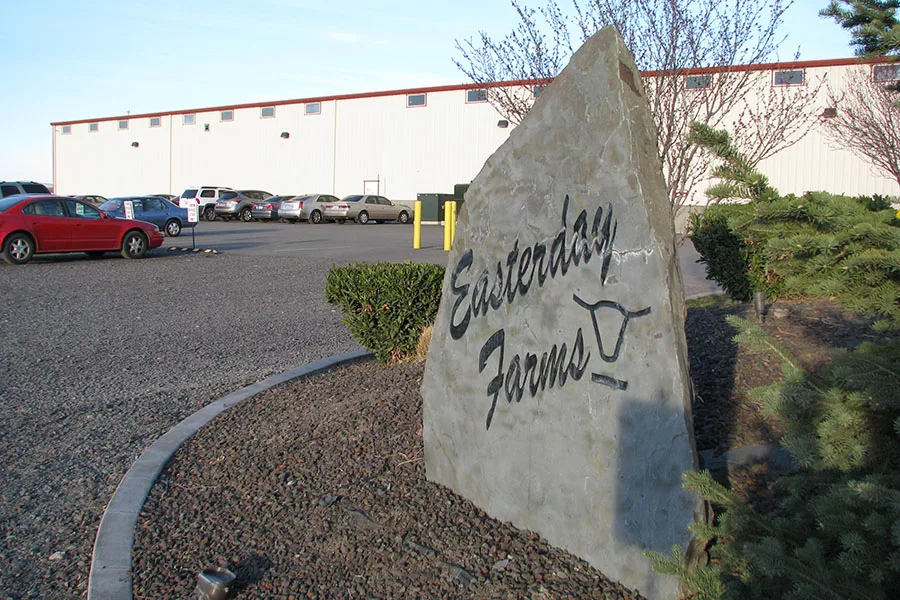
Home » Tax-paying arm of LDS church wins auction for Easterday farmlands
Tax-paying arm of LDS church wins auction for Easterday farmlands

July 14, 2021
Farmland Reserve Inc., a Utah-based nonprofit related to the Church of Jesus Christ of Latter-day Saints, was the winning bidder at a June 17 bankruptcy auction for the 22,500-acre collection of Benton County farms owned by Easterday Ranches Inc. and Easterday Farms.
Easterday, a fourth-generation, family-owned agriculture giant based in Franklin County, collapsed after Tyson Foods uncovered a $244 million fraud scheme involving more than 200,000 nonexistent cows in late 2020.
Cody Easterday of Mesa acknowledged the ghost cow scheme was meant to cover his losses in commodity futures contract trading and pleaded no contest to fraud charges in federal court in March. He faces a 20-year sentence at an Aug. 4 hearing.
His father, Gale Easterday, 79, died Dec. 10 in a head-on collision with a semitruck after driving westbound in an eastbound lane of Interstate 182, shortly before the scheme was revealed. The truck was hauling potatoes, according to an industry publication.
Farmland Reserve Inc. bid $209 million for the farmland in an auction stemming from Easterday’s Chapter 11 case, which is pending in U.S. District Court for Eastern Washington. It beat the next highest bidder, a limited liability company led by Microsoft billionaire Bill Gates, by $1 million.
According to court documents, the virtual auction was conducted via video conference and included five qualified bidders, including the Gates-led 100C LLC, which offered $208 million.
Farmland Reserve and 100C both own significant tracts of farmland in Benton County.
Farmland Reserve already controlled “far more than” the 22,500 acres auctioned in June in Benton County when it prevailed in the auction, said Ken Spencer, the county treasurer. The exact acreage was not readily available but Spencer said the Easterday property is a relatively small addition. Despite its nonprofit status, Farmland Reserve pays full property taxes, he said.
Bill Gates made national headlines in in 2018 when he paid $171 million for the 14,500-acre 100 Circles properties in southern Benton County, operating behind a national network of LLCs that led to 100C LLC. It was one of the largest transactions in the region at the time and highlighted the investment value of irrigated farmland in the Mid-Columbia.
The bankruptcy sale covers Easterday’s rights and interest to real property in Benton County, including Cox Farm, Farm Manager House, River Farm, Nine Canyon Farm, Goose Gap Farm and a property referred to as the “Storage Complex.”
The transaction covers the land, water rights, mineral rights and all improvements, including irrigation systems, fencing, utilities and other equipment.
The court approved the sale at a July 14 hearing in Yakima. The asset sale will generate funds to repay Easterday creditors and as well as nearly $2.7 million in real estate excise taxes for state and local government.
The Easterday enterprises filed for protection from creditors on Feb. 1, five days after Tyson sued over the ghost cattle scheme in Franklin County Superior Court, saying its investigation indicated that 200,000 of the 286,000 head of cattle being managed by Easterday did not exist.
Tyson, which is publicly traded, first reported the issue in a late-2020 earnings report.
Cody Easterday, along with Debby Easterday and Gale Easterday’s widow, Karen Easterday, resigned as officers and placed the company under the control of Paladin Management Group LLC, a Nevada restructuring firm.
The June auction did not address Easterday farm assets in Franklin County.
Real Estate & Construction Local News
KEYWORDS july 2021





